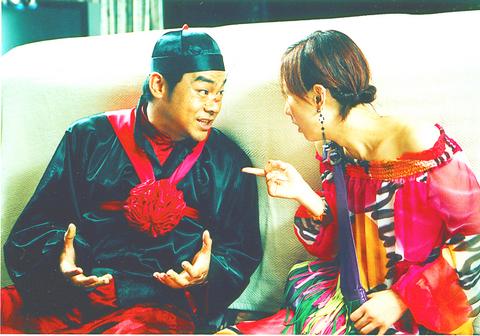Hong Kong director Johnny To (
Solid experience and a proficiency in different genres make To a natural storyteller. As in his recent comedies Needing You (

PHOTO: GROUP POWER
My Left Eye Sees Ghosts sees To continue with this formula. This time, he uses a ghost story as the vehicle for a romantic comedy that employs many of his trademarks: a fast-paced narrative, liberal use of stereotypes and biting dialogues.
This is another film in which To works with actress Sammi Cheng (
Sammi Cheng again plays the silly, naive girl next door who is single and good looking, but who always misses out when it comes to finding Mr. Right. In My Left Eye, she is even more ditsy, careless and even vulgar. She plays Ho Lei-chu, a widow who spends her days smoking and drinking. The only incongruity in this role is her rather sophisticated fashion sense. She wears the most trendy ethnic dresses and matches them with the most stylish accessories.
Ho meets her late husband after just seven days of dating. When he dies he leaves her with a huge fortune and a luxurious beach house. One day, she gets drunk and crashes her husband's favorite antique Mercedes-Benz.
At this point the ghosts show up. One of them, Wong Ken-wai (Lau Ching-wan,
Wong had been Ho's elementary school classmate until he drowned at age 13, so his ghost is still childish and silly, a good match for Ho's own ditsiness. Because he used to have a crush on Ho in elementary school, Wong has become her guardian angel, protecting her from other more malign spirits.
Although there is chemistry between Ho and her guardian, the ghost Ho wants to see the most is still her dead husband. She asks Wong for his help, even though she knows it might make him angry. But Wong has another, more pressing matter to attend to. Will Ho ever see her husband again? Where is his ghost? And what's happening to Wong, who still likes Ho?
To weaves a lot of kitschy elements into the plot, such as how Ho, in spite of all her foibles, somehow manages to always steal the boyfriend of the same girl, dead or alive. Then there are the comic Taoist priests who play hide and seek with Wong and the other ghosts. These things may seem silly, but To has skillfully woven them into a successful Hong Kong-style comedy.
Sammi Cheng proves herself adept at handling a multi-faceted character, one who can be a bitch with bad table manners on the one hand, as well as a sensitive, kind-hearted woman who loves her husband despite the fact that everyone else thinks she married him for his money. Lau Ching-wan, who plays the role of Wong, turns out an equally skilled performance to make the chemistry work between the two roles. The result shows that the prolific Johnny To still knows what makes his audiences tick.

By 1971, heroin and opium use among US troops fighting in Vietnam had reached epidemic proportions, with 42 percent of American servicemen saying they’d tried opioids at least once and around 20 percent claiming some level of addiction, according to the US Department of Defense. Though heroin use by US troops has been little discussed in the context of Taiwan, these and other drugs — produced in part by rogue Chinese Nationalist Party (KMT) armies then in Thailand and Myanmar — also spread to US military bases on the island, where soldiers were often stoned or high. American military policeman

Under pressure, President William Lai (賴清德) has enacted his first cabinet reshuffle. Whether it will be enough to staunch the bleeding remains to be seen. Cabinet members in the Executive Yuan almost always end up as sacrificial lambs, especially those appointed early in a president’s term. When presidents are under pressure, the cabinet is reshuffled. This is not unique to any party or president; this is the custom. This is the case in many democracies, especially parliamentary ones. In Taiwan, constitutionally the president presides over the heads of the five branches of government, each of which is confusingly translated as “president”

An attempt to promote friendship between Japan and countries in Africa has transformed into a xenophobic row about migration after inaccurate media reports suggested the scheme would lead to a “flood of immigrants.” The controversy erupted after the Japan International Cooperation Agency, or JICA, said this month it had designated four Japanese cities as “Africa hometowns” for partner countries in Africa: Mozambique, Nigeria, Ghana and Tanzania. The program, announced at the end of an international conference on African development in Yokohama, will involve personnel exchanges and events to foster closer ties between the four regional Japanese cities — Imabari, Kisarazu, Sanjo and

Sept. 1 to Sept. 7 In 1899, Kozaburo Hirai became the first documented Japanese to wed a Taiwanese under colonial rule. The soldier was partly motivated by the government’s policy of assimilating the Taiwanese population through intermarriage. While his friends and family disapproved and even mocked him, the marriage endured. By 1930, when his story appeared in Tales of Virtuous Deeds in Taiwan, Hirai had settled in his wife’s rural Changhua hometown, farming the land and integrating into local society. Similarly, Aiko Fujii, who married into the prominent Wufeng Lin Family (霧峰林家) in 1927, quickly learned Hoklo (commonly known as Taiwanese) and